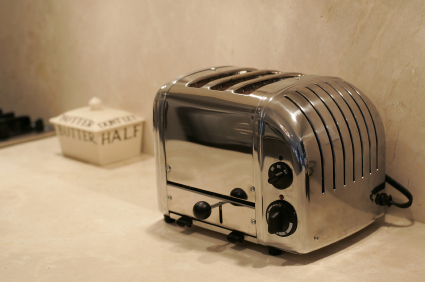
My toaster is 15 years old, and it still does its job. I put in two pieces of bread, and out pops toast. I have been tempted over the years to get a new-and-improved model, but have resisted because I know there are environmental impacts.
A replacement would need to be manufactured and shipped to me and, in the case of my toaster, it contains
rare earth metals (the heating elements are a nickel-chromium alloy) and scrap metal.
Because today’s marketers constantly tell us we deserve to have new and shiny things, it is oftentimes easy to overlook the environmental impact of our purchasing decisions, especially with products like toasters and other small appliances.
Some things to consider before buying a new product:
- Buy quality. Spending a little more on a quality product will ensure a longer life. For example, FixItClub.com tells us, “A quality toaster that is regularly maintained can last 10 or more years. A cheap unit may last only two or three years.”
- Repair before you throw away. Depending on the product, you can have it professionally repaired or do it yourself. There are many online resources that can walk you through easy repairs. One example is FixItClub.com, and another is RepairClinic.com, both sites offer step-by-step guides on DIY repair and maintenance tips.
- Read owner’s manuals and follow directions on maintenance. Keep your appliances clean.
- Sell or donate useful small appliances to a local charity. Places like Goodwill and Salvation Army are happy to take small appliance donations. For more information, visit http://locator.goodwill.org/ to find Goodwill in your area or http://satruck.org/ to find a Salvation Army.
- Find recycling locations in your area here at 1-800-RECYCLING.com. Simply type in your ZIP code and click on the type of materials or products you want to recycle.
If we all do our part, we can divert items from needlessly going to landfills before their time and help to reduce pollution, save energy and protect the environment.
 My toaster is 15 years old, and it still does its job. I put in two pieces of bread, and out pops toast. I have been tempted over the years to get a new-and-improved model, but have resisted because I know there are environmental impacts.
A replacement would need to be manufactured and shipped to me and, in the case of my toaster, it contains rare earth metals (the heating elements are a nickel-chromium alloy) and scrap metal.
Because today’s marketers constantly tell us we deserve to have new and shiny things, it is oftentimes easy to overlook the environmental impact of our purchasing decisions, especially with products like toasters and other small appliances.
Some things to consider before buying a new product:
My toaster is 15 years old, and it still does its job. I put in two pieces of bread, and out pops toast. I have been tempted over the years to get a new-and-improved model, but have resisted because I know there are environmental impacts.
A replacement would need to be manufactured and shipped to me and, in the case of my toaster, it contains rare earth metals (the heating elements are a nickel-chromium alloy) and scrap metal.
Because today’s marketers constantly tell us we deserve to have new and shiny things, it is oftentimes easy to overlook the environmental impact of our purchasing decisions, especially with products like toasters and other small appliances.
Some things to consider before buying a new product: